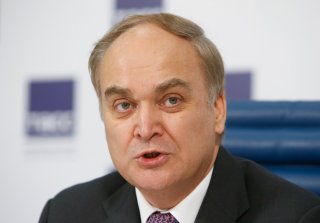Interview with Russian Ambassador Anatoly Antonov: “We Have to Fight Lies and Fake News Virtually on a Daily Basis.”
National Interest editor Jacob Heilbrunn interviews Ambassador of the Russian Federation to the United States of America H. E. Anatoly Antonov.
Heilbrunn: One issue that has aroused concern in recent years is the matter of high-level access for Russian and American diplomats in Washington and Moscow? Do you believe you have adequate access now? Has it improved? Are there any serious disappointments?
Antonov: After returning to Washington in the aftermath of the Geneva summit, I had an opportunity to meet with some senior officials in the administration. However, these meetings were mostly isolated incidents. According to diplomatic practice, dozens of requests have been sent in order to conduct "courtesy visits" of the Russian Ambassador to the newly appointed leaders of key American authorities. The vast majority of them have been either denied or ignored.
Sometimes we fail to organize high-ranking conversations, even when we need to convey certain signals on behalf of Moscow.
The situation with contacts on Capitol Hill is still depressing. All my meeting requests addressed to the heads of parties, factions of both chambers of Congress, as well as committees on foreign affairs, have seemingly gone into the void. They just remain unanswered. At the same time, the State Department shrugs its shoulders and claims that it cannot provide any assistance because of "separation of powers.”
Heilbrunn: In 2017 there was a summit between former president Donald Trump and President Putin in Helsinki. While the meeting itself was highly controversial, there were also high expectations that relations between Washington and Moscow might improve. The meeting between Biden and Putin in Geneva proved to be less controversial. Do you see a new momentum or more business as usual?
Antonov: It is too early to make any judgments in this regard. At this point, we can positively assess the agreement between the two presidents to restore professional and systemic dialogue on key topics of mutual interest. These include the issues already mentioned—strategic stability, cybersecurity and functioning of diplomatic missions.
You are right that, as we have seen earlier, the positive impetus of our leaders has drowned in the corridors of the U.S. bureaucracy and has been doomed for fruitlessness. Let us hope that Russia-U.S. relations will no longer be a token coin in the U.S. domestic political rivalry. Their improvement serves crucial security interests of Russia, the United States and the whole world. It will take time and efforts from both sides. And we are ready for such work.
Image: Reuters

